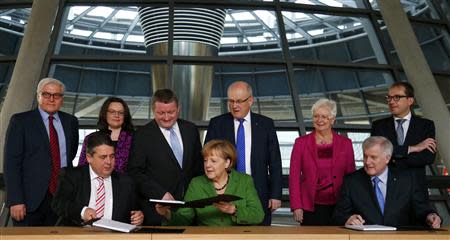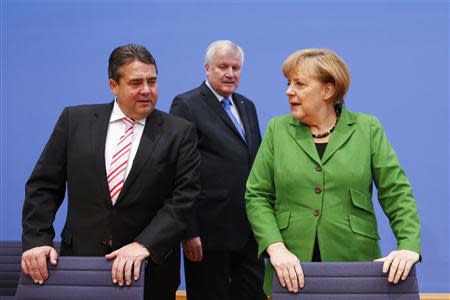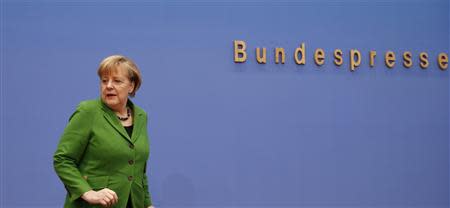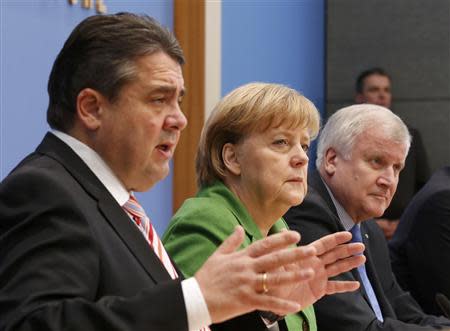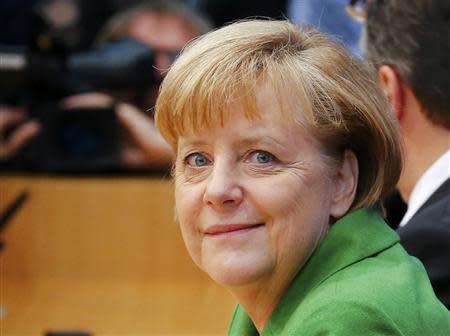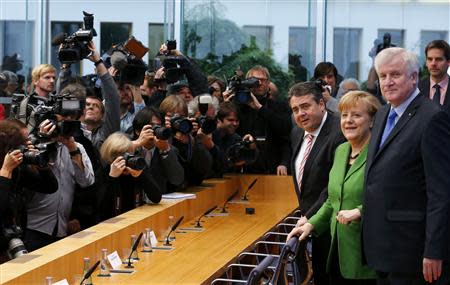Merkel clinches "grand coalition" deal with SPD
By Andreas Rinke and Noah Barkin BERLIN (Reuters) - Chancellor Angela Merkel clinched a coalition deal with the Social Democrats (SPD) on Wednesday that rolls back decade-old reforms of the German welfare state but preserves Berlin's strict approach towards struggling European partners. The agreement, spelled out in minute detail in a 185-page policy document entitled "Shaping Germany's Future", was struck two months after Merkel emerged victorious from an election but fell just short of a parliamentary majority. The result forced the popular 59-year-old Protestant pastor's daughter from East Germany into negotiations with the arch-rival SPD, with whom she ruled in an awkward "grand coalition" during her first term from 2005-2009. The SPD is still smarting from that experience, and its leadership has agreed to put the new deal to a vote of the party's 474,000 card-carrying members, adding an element of uncertainty to Merkel's goal of having a new government in place by Christmas. "We entered negotiations with very different ideas, and that is why things took a little time," Merkel told a news conference, sitting between SPD Chairman Sigmar Gabriel and Horst Seehofer, leader of the Bavarian Christian Social Union. Gabriel said he was sure a "broad majority" of SPD members would back the deal in the mail-in vote, the results of which are due to be published on December 14. All three politicians praised the atmosphere in the talks, with Gabriel and Seehofer joking with reporters about whether they could now address each other with the informal "du" in place of the formal "sie". "Perhaps that changes after you win the poll of your members," quipped Seehofer. The deal was greeted with a sigh of relief by investors, who pushed the euro currency to a four-year high against the Japanese yen and a one-month peak versus the U.S. dollar. It was also welcomed by officials in Brussels and other European capitals. The lengthy talks have delayed movement on major European reforms, including progress on "banking union", an ambitious project designed to prevent a recurrence of the euro zone's crippling debt crisis. "It's positive news," Italian Prime Minister Enrico Letta told reporters in Rome. "A lot of time has passed and there's a need for a German government as soon as possible." SOFTENING SCHROEDER Merkel stood firm against SPD demands for tax hikes on the rich, but to clinch the deal she agreed to introduce a minimum wage of 8.50 euros per hour, which some economists have warned could push up unemployment, particularly in eastern Germany. To reduce that risk, the parties agreed to phase it in over a period of years, with exceptions allowed until 2017. The SPD also secured concessions from Merkel on pensions and labor market rules, softening elements of the "Agenda 2010" reforms introduced a decade ago by Merkel's predecessor as chancellor, Gerhard Schroeder of the SPD. In the future, people who have worked for 45 years can earn full pensions from 63, four years earlier than the statutory 67-year threshold. The use of temporary workers by German firms will also be restricted to 18 months under the deal. "At a time when other euro zone members are undertaking important reforms to the welfare state, Germany is conspicuously shirking them - and even backpedalling on them," said Nicholas Spiro, head of Spiro Sovereign Strategy. "The decision to introduce a mandatory minimum wage and, more worryingly, lower the retirement age runs counter to recent entitlement reforms across the euro zone. Germany is hardly leading by example." Hopes in France and other euro zone states that the SPD might convince Merkel to adopt bolder measures to stimulate growth and tackle unemployment were dashed in an agreement that endorsed Merkel's carrot-and-stick approach to the euro crisis. The coalition deal ruled out all forms of debt mutualisation and called for euro zone members to agree to binding reform contracts to boost competitiveness. A compromise on banking union made clear that Europe's rescue fund could only be used to recapitalize stricken banks when all other avenues had been exhausted. "The new government will continue the successful euro zone policies of the last few years of support for struggling countries in exchange for economic reforms and tighter fiscal rules," said Christian Schulz of Berenberg Bank. Carsten Nickel, a political analyst at Teneo Intelligence, said the SPD had realized that on euro zone policies "the domestic political consensus does not reward any large-scale deviation from Merkel's path". CABINET In a nod to SPD grassroots members who warned their leaders against dividing up top jobs too soon, cabinet posts will not be announced until after the SPD referendum. But the important ministries appear set. Wolfgang Schaeuble, Merkel's trusted 71-year-old finance minister, is expected to keep his job, and Frank-Walter Steinmeier of the SPD is seen returning as foreign minister, a post he held in the last "grand coalition" government. Gabriel, a former environment minister under Merkel, is also likely to join the cabinet, possibly as head of a beefed-up economy ministry. The SPD remains traumatized by its first partnership with Merkel; after four years, the SPD scored its worst election result of the post-war era in 2009, winning just 23 percent. Left-wingers, already bitter about Schroeder's labor reforms, abandoned the party in droves. The watering down of these reforms could encourage members to back the deal, but the risks of a veto cannot be ruled out. Alex White, an analyst at J.P. Morgan, estimated the chances of a "no" vote at up to 20 percent. Were the party to reject the agreement, Merkel could seek a coalition with the environmentalist Greens, whom she sounded out before deciding on talks with the SPD. Merkel wore a Green blazer to the news conference on Wednesday - a choice some German media read as a warning to the SPD that she has other options. A new election is another possibility if SPD members refuse to support the deal. (Additional reporting by Alexandra Hudson, Annika Breidthardt, Holger Hansen, Madeline Chambers, Michelle Martin, Erik Kirschbaum; Writing by Noah Barkin and Stephen Brown; Editing by Will Waterman)

